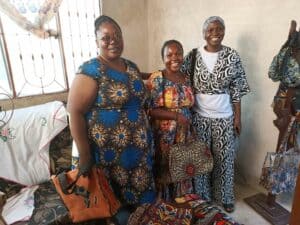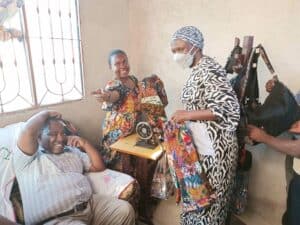Partner Facility in Tanzania Offers Lessons for Zambia, Kenya
Recently, 13 Fistula Foundation team members from Zambia and Kenya traveled to our partner facility Comprehensive Community Based Rehabilitation in Tanzania (CCBRT), in Dar Es Salaam, for an opportunity to learn from a trusted partner in fistula care.
Ten team members from Zambia and three team members from Kenya convened at CCBRT to tour its facility, to discuss the treatment network model in their respective countries, and to share creative solutions to common problems in fistula programming.
“We’re grateful to Comprehensive Community Based Rehabilitation in Tanzania for hosting our teams,” said Lindsey Pollaczek, vice president of programs. “The visit provided an excellent opportunity for sharing best practices and lessons learned to enhance fistula programming across Kenya, Zambia, and Tanzania. The experience allowed teams to discover new viewpoints and approaches for providing holistic fistula treatment—from state-of-the-art treatment services to effective community mobilization and reintegration strategies. It was a mutually beneficial learning experience for all. Without a doubt, everyone feels reinvigorated to perform this important work of building a world where no woman suffers needlessly from fistula.”
CCBRT has an intensive rehabilitation program, known as the Mabinti Centre, that teaches women sewing, screen printing, beading, business skills, life skills, and English. Since 2007, the Mabinti Centre has trained 147 former fistula patients in these skills, empowering them to start their own businesses, secure employment, and become financially independent.
Team members toured the Mabinti Centre and learned about how CCBRT built a structured skills training program.


Bwalya Chomba (left), program director for Zambia, and Habiba C. Mohamed (right), regional director, visit Lydia (middle), a fistula survivor and graduate of the Mabinti Centre at Comprehensive Community Based Rehabilitation in Tanzania. Habiba (right) views the handbags and other goods designed and sewed by Lydia.
“It was an entertaining, informative, and memorable trip!” said Bwalya Chomba, program director for Zambia. “We all had a memorable experience, which has positively reinforced our approach towards our work.”
The model of holistic care employed by CCBRT offered inspiration to the entire Zambia team, Chomba said. Team members look forward to adopting new strategies to improve outreach and rehabilitation efforts—from strengthening mobile referral systems to better incorporating male advocates in fistula programming. As always, the ultimate goal for our colleagues in Kenya, Zambia, and Tanzania is to reach more women with fistula.
Published on September 15, 2022
